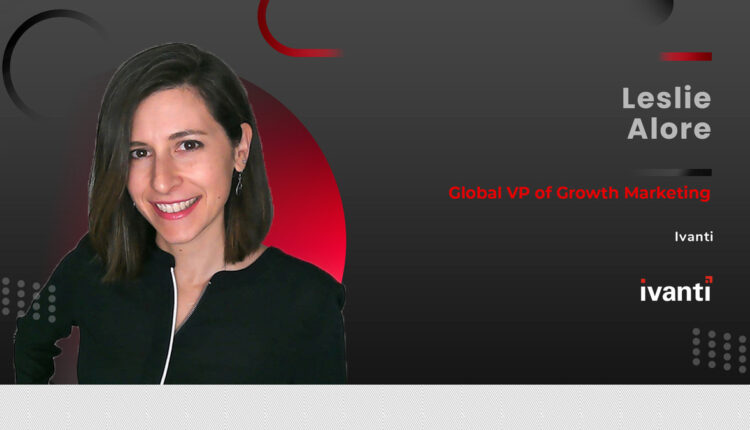Hi Leslie, could tell us about you your journey in Tech? 
I’ve always been interested in technology. In fact, I went to engineering school before I found my love for business. I was lucky enough to get an internship with a company that was looking for someone to help the marketing team implement Eloqua, figure out how to use it, and teach everyone else. That was my first real job after college, and I was hooked on marketing tech!
I become obsessed with figuring out how to make us
e of every bell and whistle of the tool. As marketing tech started to explode in the market, I couldn’t get enough. I’ll admit to having shiny new object syndrome for a while, but over time I learned it’s not about how much tech you have, but how you use it.
Through the years I took on different roles in the marketing
team, in sales ops, corporate strategy, and event product innovation. Over time I learned to reorient myself to starting with business outcomes in mind, building a strategy to achieve those, looking to the tools I had to get me there, and then supplementing with new tech only when needed. I still geek out over new tech, but I’ll admit it’s almost more exciting when you try a new way of using what you already have and the results shine!
How has the Covid-19 pandemic reshaped your view of the business environment that your business operates in?
Honestly, it hasn’t reshaped my view. The pandemic was largely a forcing factor for a view which I already held, which is that the best business outcomes come from the best buyer & customer experiences. Those experiences are best when they’re delivering real value to a person, which means offering something useful to them at the right time in the way they want it.
We were all forced out of some of the old school things we always did just because we always did them and had to be more intentional about the marketing experiences we created. I grabbed this opportunity to jump into a buyer-led marketing approach, taking the lead from B2C companies that have been doing this for years.
I was lucky enough to join Ivanti at a time when our business was ready to embrace change in the pursuit of growth, and I work with an amazing leadership team who gave me the space to shift to this new approach. It wasn’t hard to convince them. We all know B2B buyers want more control and better experiences that feel more like a B2C experience – Precision Demand Marketing. We all agreed it was time to be brave and try that.
We’ve completely aligned our go-to-market across sales and marketing based on the idea that our customers should experience us as One Ivanti – a provider that’s here to deliver integrated and innovative solutions to their needs in the way they want to solve them. I’m really proud of the progress we’ve made so far. It’s definitely a journey and we will never be done optimizing and improving.
What sets Ivanti apart from the competition?
Ivanti is as ambitious, brave, and innovative in every facet of our business as we are in our marketing team. Just as we’re leaning into leading-edge marketing practices, we’re doing the same with the solutions we bring to market. We have some big competitors in all three of our major product pillars – all brands you’d recognize very well – yet we’re making big steps in analyst assessments because no other company is bringing all three of these pillars together in the cloud under a single pane of glass the way Ivanti is.
We’re also bringing some cool automation capabilities to the table that will really elevate our customers’ game. Not only do our solutions shine on their own, they are coming together in a way that creates synergies and control across IT and Security teams no other vendor is offering.
Also Read: MarTech 360 Interview With Jason Widup, VP of Marketing at Metadata.io
How do you see the IT Automation sector evolving over the years to come?
Again, it all comes down to experiences. No one thinks of IT as a department that’s focused on making employee experiences better. Why not? People recognize cybersecurity is a big deal, and yet no employee wants their life to be harder due to company security protocols. Today that’s a balancing act IT and security teams need to play.
There’s a generally accepted tradeoff there….but what if it wasn’t? What if IT software could do more than help IT teams do what they need to get done…what if it could transform the experience of every employee and free up IT teams to do more strategic and impactful work that drives the business forward? That’s the future of IT software and IT automation.
It sounds cheesy, but I’m living it today! When I joined Ivanti 18 months ago, I was blown away by the fact that I don’t have to type in my password 18 times a day; don’t have to sign into VPN, don’t have to change my password every three months (or more if I forget it), don’t have to open a ticket and chase IT because my computer is doing something weird. We’re drinking our own kool-aid and it’s a flavor everyone will love once they get a taste.
How do you see the businesses coping with the inherent risks of remote work?
Well, this is what we do. Ivanti’s mantra is “we make your everywhere workplace possible.” Our business is going to cope by leading by example, leveraging the amazing solutions we offer! Businesses that evolve and embrace the everywhere workplace and the technology that will allow them to secure, manage and service their business and employees wherever they are will thrive because the will protect themselves, retain their employees, and attract the best talent.
As a Marketing leader, what is the one piece of advice you would give to those who aspire to the C-suite?
Step out of marketing and do something else. Seriously! Find a way to see the business from a different perspective and really develop your business acumen. Every successful leader in any function needs to speak the language of business. I sometimes think marketers need to work twice as hard to develop credibility in this area because for so long we’ve been type-cast as the ‘creatives,’ the ‘event planners’ or the ‘swag shop.’ Those are necessary functions marketing delivers to a business and there’s great skill and value there, but marketing can – and should be – so much more!
Your top pick for a book on Marketing that everyone should read?
I can’t pick just one, so I’ll give you one new one and one old one:
I’m pretty excited for folks to get their hands on the new book Jeremy Bloom and Deb Wolf wrote: Precision Demand Marketing: Achieving the Promise of Predictable Pipeline. I genuinely believe in PDM and I really think this book is a great way for marketers and business leaders to get a grasp on the concept.
A tried and true one that’s super fascinating and fun to read, as well as practical, is Made to Stick by Chip and Dan Heath. It’s a two-for-one because you can apply the principles of telling great stories in customer-facing marketing as well as internally.
Could you name one (or more) marketer that should feature here? Pete Lorenco from Alyce, Tory Kindlick at Refine Labs, Melissa Puls (my boss!)
Top 5 apps that you use for business?
Notability for handwritten notes on my iPad (I have to write things down to remember them, but I like having all my notes with me anywhere I go on any device)
MS Office Suite. Boring, I know, but I can’t pretend like I don’t live my life in Teams, Outlook, Excel and PowerPoint. I also use Microsoft To-Do to manage all my lists…I’m a list person!
Domo – consolidated reporting is critical, especially in a complex and fast-paced business like Ivanti
Miro – this is such a great tool for virtual collaboration! It’s like a virtual whiteboard on steroids. Anyone running a distributed team should get a tool like this.
Down Dog – this is a yoga app and it’s not technically ‘for business,’ but let’s be real, we need to find ways to relax if we’re going to be effective and productive in business!
What metrics do you use to define success?
I look at metrics on 3 levels: (1) Financial metrics which align to business outcomes; (2) Operational Metrics which are KPIs for the financial; and (3) tactical metrics which help inform the ongoing performance and optimization of marketing tactics that drive the operational results.
The financial metrics are the same for everyone across marketing because they’re the metris every business function is tracking. Most notably today we focus on Pipeline & Bookings – (volume, value, conversion, week-over-week trends) and I mean TOTAL pipeline and bookings, not just what marketing is contributing to.
The operational and tactical metrics vary within the marketing team team and the GTM segments of the business. For example, in our Enterprise segment we measure monthly target account engagement – I want to know whether we are successfully engaging our target accounts AND whether we’re sustaining that engagement. We also set targets against the number of meetings scheduled by our business development team and how these convert to pipeline. In the small business segment, we’re looking at more transactional metrics like number of Marketing Qualified Leads, and how those convert.
At a tactical level, we look at all the same things as everyone else: Web traffic and conversion, CTR, CPL, etc. We don’t talk about these to our business partners, but we do need to be constantly monitoring and optimizing for performance at this level within the marketing team to make sure we are pulling the right levels to impact business outcomes.
Also Read: MarTech 360 Interview With Hersh Patel, Founder and CEO at Hindsight


Comments are closed.